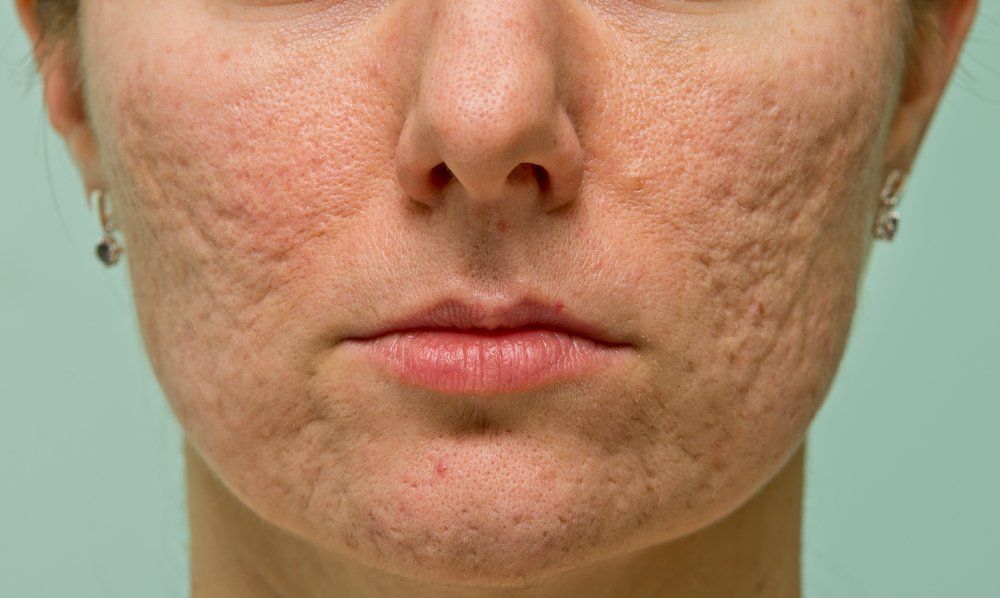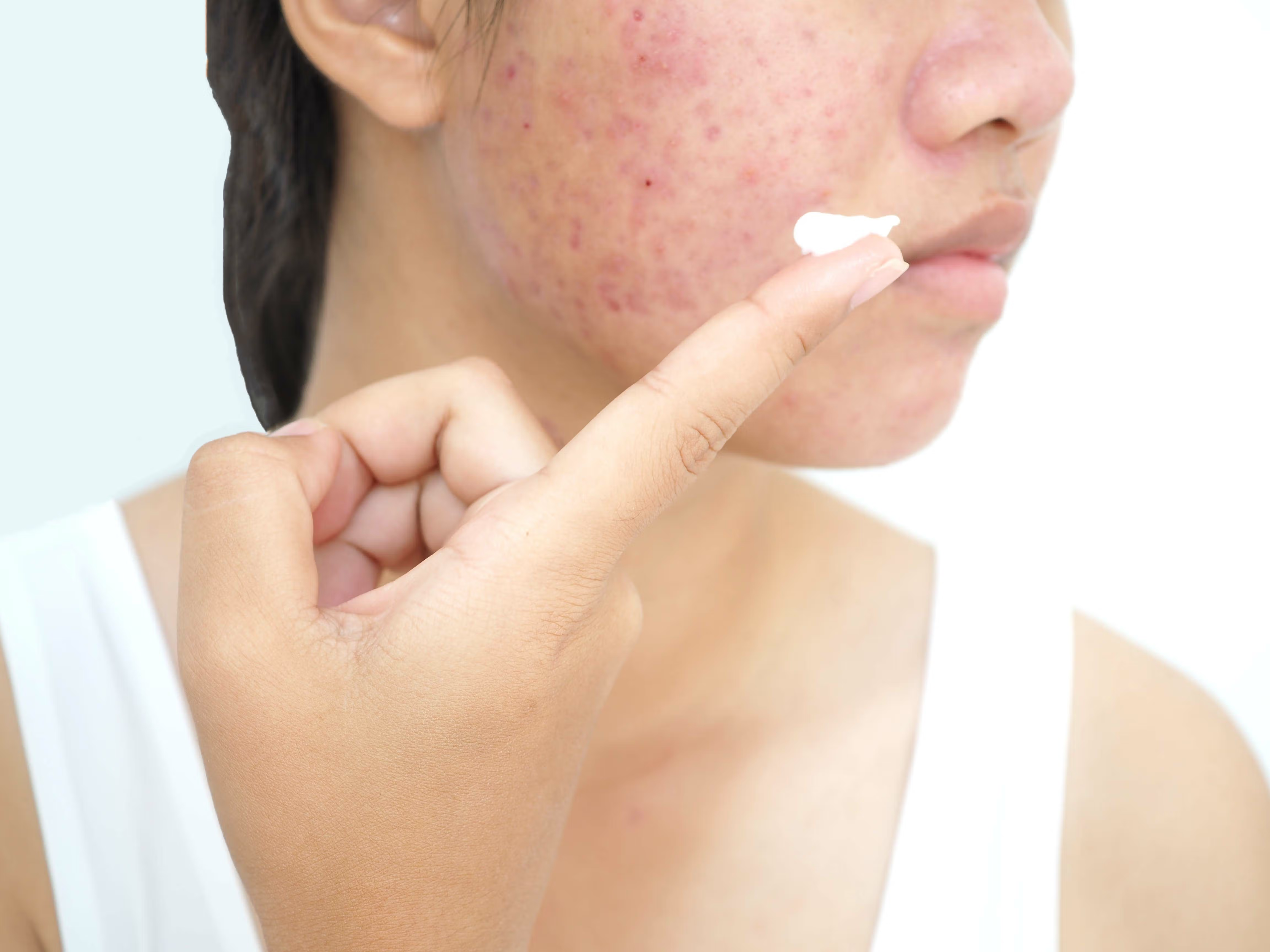- Case-Based Roundtable
- General Dermatology
- Eczema
- Chronic Hand Eczema
- Alopecia
- Aesthetics
- Vitiligo
- COVID-19
- Actinic Keratosis
- Precision Medicine and Biologics
- Rare Disease
- Wound Care
- Rosacea
- Psoriasis
- Psoriatic Arthritis
- Atopic Dermatitis
- Melasma
- NP and PA
- Skin Cancer
- Hidradenitis Suppurativa
- Drug Watch
- Pigmentary Disorders
- Acne
- Pediatric Dermatology
- Practice Management
- Prurigo Nodularis
- Buy-and-Bill
Article
Risk of scarring in adults with persistent acne
Author(s):
The choice of treatment for acne in adolescence may impact the risk of later scar formation when the condition persists into adulthood, shows a recent study.
“It seems that topical retinoid maintenance therapy should be continued for up to two years after oral treatment in order to reduce scarring," says Ewa Chlebus, M.D., Ph.D, Nova Dermatology Centre, Warsaw, Poland. (©BudimirJevtic/Shutterstock.com)

The choice of treatment for acne in adolescence may impact the risk of later scar formation when the condition persists into adulthood, shows a recent study published in Cutis.1 Opting for isotretinoin or topical retinoids rather than antibiotics when treating teens may help reduce that risk, the study authors suggest.
READ MORE: Why does acne leave a scar?
Both persistent adult acne, defined as acne that continues or reoccurs after adolescence, and late-onset acne are considered difficult cases as they can often be resistant to treatment.2 Adult skin also tends to be more sensitive to topical agents, which increase the risk of scarring.
Topical and oral retinoids have been successfully used for decades to treat acne, and their anti-inflammatory activity acts against comedones. American Academy of Dermatology guidelines also emphasize that retinoids have an important role to play in acne therapy.3
This study included 111 consecutive patients (101 women and 10 men) who visited the Nova Derm Dermatology Centre between May 2015 and January 2016 for adult acne. All patients were aged 25 years and older; 20 patients were aged 25–29 years; 61 were aged 30–39 years; and 30 were 40 years or older.
Ninety one patients (81.98%) had persistent adult acne, of which 68.13% described their disease as severe, but 43.96% of patients with persistent adult acne underwent no treat¬ment with antibiotics, isotretinoin or topical retinoids during adolescence.
Overall 80.22% of patients with persistent adult acne never used topical retinoids during adolescence and did not receive main¬tenance therapy, which may be because there were no strict recommendations regarding retinoid treatment when these patients were adolescents or young adults, write study authors Ewa Chlebus, M.D., Ph.D, Nova Dermatology Centre, and Marcin Chlebus, Ph.D., University of Warsaw, Warsaw, Poland.
RELATED: Aggressive, early treatment may prevent acne scars
In contrast, only one patient older than 25 years with late-onset adult acne (<1%) had never received treatment with oral antibiotics, isotretinoin treatment or topical retinoids. Only 25.27% of patients had not been treated with topical retinoids, and 35.16% completed at least two treatment courses, which is likely to be the results of the spread of knowledge over the last 25 years about the benefits of topical retinoids, adds study authors.
Acne scarring was evident in 53.85% of patients with persistent adult acne, and the likelihood of scarring varied according to the treatment received in adolescence.
“We found that using oral antibiotics did not diminish the number of scars among persistent adult acne patients in adulthood. In contrast, isotreti¬noin or topical retinoid treatment during adolescence decreased the risk for scars occurring during adulthood,” the study authors write. “The decrease of scar formation in adult acne due to reti¬noid treatment in adolescence indirectly justifies the role of maintenance therapy with topical retinoids.”
Regarding the findings, Dr. Ewa Chlebus tells Dermatology Times, “It is well-know that severe acne is an indication for oral isotretinoin, which reduces scarring. However, it is not commonly accepted to treat patients with chronic, less severe acne lesions with oral isotretinoin.”
She adds that the evidence suggests that isotretinoin can be administered in small doses for a little longer than one year.
“Topical retinoid maintenance therapy is not commonly used either,” Dr. Chlebus adds. “It seems that topical retinoid maintenance therapy should be continued for up to two years after oral treatment in order to reduce scarring.”
RELATED: 10 Treatment options for acne scarring
Many adolescent patients do not tolerate the irritation caused by retinoids, Dr. Chlebus mentions to Dermatology Times.
“They do not want to accept this uncomfortable situation. Adolescent patients expect topical treatment to be smooth and pleasant,” she says. “Moreover, they need an explanation about the role of comedones. These patients are mostly preoccupied with skin inflammation, which is treated with external antibiotics.”
References:
1. Chlebus E, Chlebus M. The role of adolescent acne treatment in formation of scars Among patients with persistent adult acne: evidence from an observational study. Cutis. 2019;104(1):57-61.
2. Dréno B, Layton A, Zouboulis CC, et al. Adult female acne: a new paradigm. J Eur Acad Dermatol Venereol. 2013;27(9):1063-70.
3. Zaenglein AL, Pathy AL, Schlosser BJ, et al. Guidelines of care for the management of acne vulgaris. J Am Acad Dermatol. 2016;74(5):945-73.e33.





